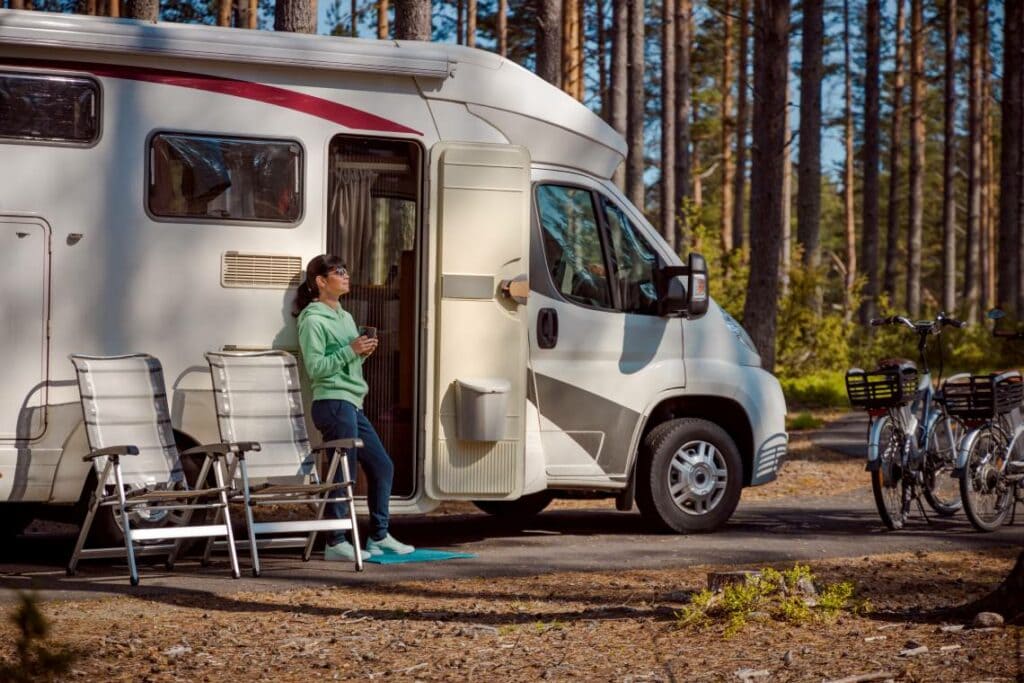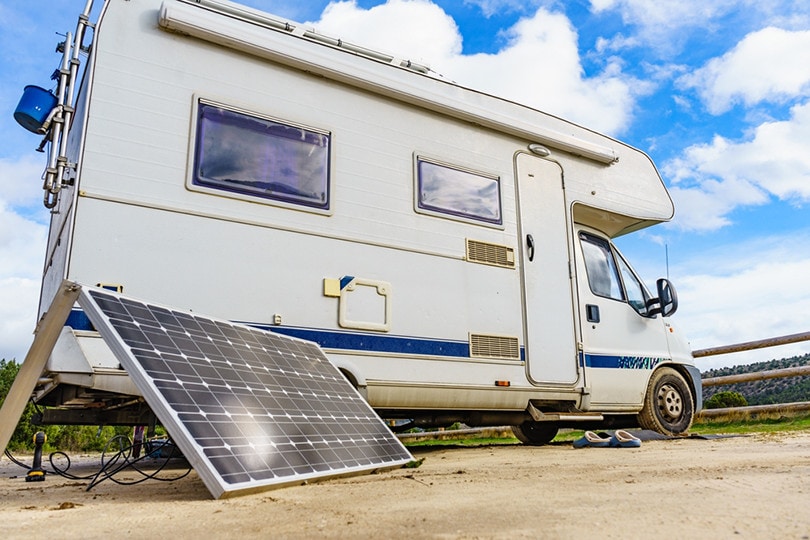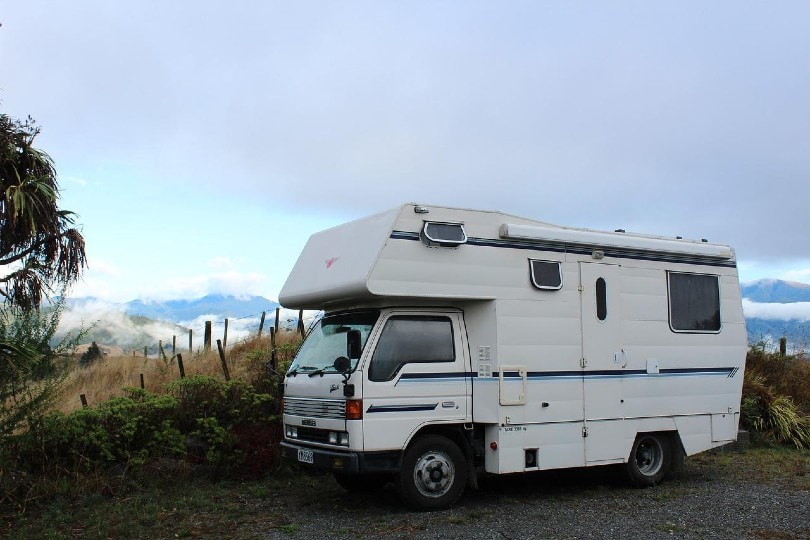Can You Park an RV on Your Own Land? Tips, Steps, & Benefits
-
Pete Ortiz
- Last updated:

Parking an RV is one of the biggest headaches of owning one. This is especially true if it’s your first recreational vehicle, and you might end up feeling overwhelmed by parking regulations, parking spots, and prices.
One of the most common questions RV owners ask is whether they can park their RV on their land. Well, the answer is yes; you can lawfully reside in an RV and station it on your property but only if you have the proper permits required in many states.
In this article, we will give you a better understanding and highlight some tips that come in handy when you want to park your RV on your property. Let’s dive in!
Parking an RV on Your Land
- The need for easy accessibility of water and sewer facilities available on the land.
- Having the RV as one’s residence.
- Parking the RV on your property when not in use instead of renting a storage facility,
Parking the RV and using it as a permanent residence is the quickest way to live on a piece of land for many people since the cost of purchasing an RV is lower than that of constructing a house. The best part is that having an RV may also qualify you for some tax deductions if you claim it as your permanent residence.
You can also claim your RV as a second home if it is equipped with sleeping, cooking, and bathroom facilities. However, ensure you check with your attorney or financial consultant whether this is applicable depending on your unique circumstances.
The 3 Steps to Accelerate Your Permanent Residence Process
1. Contact Your County Building Office

The first step to getting a permit is contacting your county building officer and checking the zoning requirements and building codes. You can also find that information on the county website easily.
Many counties don’t have special requirements when parking one or two RVs on a private estate. This policy changes when one decides to add any structures such as septic tanks, garages, or decks, as you may need to get a special permit.
2. Ensure That You Have an Address for Your Property
It is less difficult to get a permit if your property already has an address. You should, however, note that the application for an address is handled as part of a building permit even though you intend to have no structures on the land apart from the RV.
3. Get an Attorney
Getting an attorney, especially one experienced in handling land matters, will make the process much easier for you. They will guide you on what the county official looks for and how to proceed.
The 5 Tips on How to Park Your RV Correctly on Your Land
Parking your RV on your land is not as straightforward as it seems. There are some factors you need to take into consideration.
1. Choose Your Parking Spot Wisely
Once you’ve gotten a permit that allows you to park on your land, the next thing you need to consider is where to park it. The best place would be on a flat and stable surface that is easily accessible to make maneuvering the RV in and out of the property easy.
Ensure that you don’t park your RV in an area with poor drainage since it might sink into the ground and get stuck. Adding concrete to the parking spot is one way of ensuring that this doesn’t happen. If you are using your RV as your residence, ensure you’re close to a water source.
2. Ensure You Have Somewhere to Dump Your Waste
If the waste in the RV accumulates and stays in the dump tanks for a long time without being disposed of, it could lead to unhealthy living conditions. Therefore, you should have a sewer to dump the gray and black water.
If your land does not have sewage facilities, find another solution, such as driving your RV to a local dumping station at least once or twice a week, depending on the number of occupants.
3. Electricity
You might need to invest in a good and powerful generator if there is no electricity on the property. Another great option would be getting a solar panel, battery bank, and an inverter. Having both is ideal since it ensures that you will not go without power at any one time.
You only need a 30- or 50-amp hookup to connect to the RV if there is electricity on the property. This power should be enough to run your recreational vehicle.
4. Consider the Weather

It’s crucial to consider the weather conditions in the region where your property is located. If you have strong winds in the region, strapping your RV to metal poles is a good idea. To prevent damage and prevent debris carried by the wind from hitting it and denting the metal, or breaking the windows, you could construct a shelter for the RV.
Getting a cover for the RV is also crucial when living in a rainy area since it helps protect it from water damage. A shelter would also be an appropriate measure in this case.
Scorching conditions can also make it uncomfortable if you live inside the RV or damage it by overheating it and causing the paint to peel. In this case, building a shelter for your RV or parking it under a tree is an excellent way of preventing sun damage.
5. Clean Out Your RV
It is vital to ensure that you clean the RV properly to be ready for your next trip if you are not living in it while it’s parked on your land. Clear out the refrigerator to prevent the food from going bad and clean out all the tanks to prevent the water lines from bursting and any sediments from accumulating at the bottom of the tanks.
The 3 Benefits of Parking Your RV on Your Property
Numerous advantages come with the self-storage of your RV, irrespective of whether you use it as your primary residence or on a part-time basis. Here are the 3 main benefits:
1. Security
Since RV prices are often high, security should be a top priority. It is safer to park your RV on your private property than to use camping grounds.
Storing your RV on your estate allows you to apply all the safety measures that you would like, and also watch out for thieves and vandals. To prevent the RV from rusting and getting damaged, you can also keep it in suitable storage facilities.
2. Accessibility
Parking your RV on your land makes it easily accessible to use it as often as you want. You can wake up in the morning and decide to take a camping trip, and the RV will be right there!
3. Affordable

It is more affordable to park your RV on your land than parking on overnight campsites and RV parks, which charge an average of $30 to $50 a night. If you are not a homeowner yet and use your RV as your permanent residence, living in your RV will save you money that would have otherwise been used on mortgage or rent.
FAQs
Q: What is the downside of parking your RV on your property?
Stationing your RV on your property could be overwhelming since all the security and maintenance costs fall on you.
Q: Is it legal to park your RV on someone’s private property?
Yes, you can park on someone else’s private land as long as you have their permission.
Q: What are other parking options?
You can park your RV at camping grounds in national parks and forests, outside businesses that offer parking facilities, or at overnight RV parks.
Final Thoughts
Maybe you like taking vacations with your family, enjoy camping, or are thinking of turning it into a home. Whatever the reason, many RV owners will attest that there are significant advantages to owning one.
RVs are very convenient, especially for people who love traveling and having adventures. You can also park it on your land and the tips above should help you find parking spots for your RV without falling on the wrong side of the law.
Featured Image Credit: Armyagov, Shutterstock
Contents



